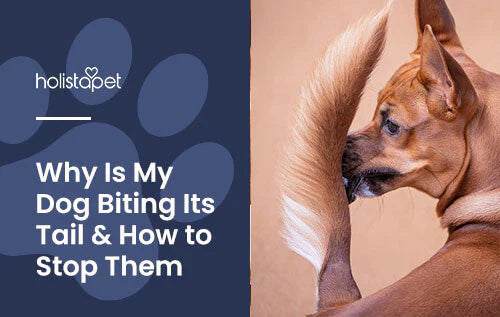It's frustrating to see your furry friend in a tailspin—literally! A dog biting its tail isn't just a quirky behavior; it can be a sign of something more serious.
In this read, we'll explore the root causes of dog tail biting, offer practical solutions, and share tips to prevent your pup from turning their tail into a chew toy. Let's get your canine bestie wagging happily again!
Why Do Dogs Bite Their Tails?

Dogs bite their tails for various reasons, ranging from minor irritations to deeper behavioral or health issues. Sometimes, it's just an itch they can't ignore, while other times, it's a sign of something that needs attention. Understanding your dog's tail-chewing habit is the first step to addressing the problem.
Common Reasons for Tail Biting
Dogs gnaw at and bite their tails for a number of reasons. Here are the most common culprits:
- Fleas and Ticks. These tiny pests can cause relentless itching, which can lead to your dog's tail biting and chewing behavior.
- Allergies. Certain foods or environmental factors might trigger allergic reactions, causing irritation and tail chewing.
- Skin Irritations. Dry skin, hot spots, or minor rashes can make your pet's tail an uncomfortable target for relief.
- Issues With the Anal Glands. Discomfort in this area can cause dogs to chew near their tail.
- Boredom. Lack of mental or physical stimulation might drive your pup to this repetitive behavior.
Behavioral Causes of Tail Biting
Sometimes, dogs biting their tails has less to do with physical discomfort and more to do with their habits. Here are the key behavioral causes:
- Stress or Anxiety. Dogs may resort to tail biting as a coping mechanism for nervous or worried thoughts.
- Boredom. Without enough playtime or stimulation, dogs might engage in repetitive behaviors like tail chasing and chewing.
- Attention-Seeking. Some pups quickly learn that tail biting gets their owner's attention.
- Obsessive-Compulsive Behavior. In rare cases, dog tail biting can become a compulsive act.
Health Issues That Cause Tail Biting
Health-related problems are a major reason dogs might start biting their tails. For example, fleas, food allergies, or even an infection might cause itching or irritation. When dogs feel discomfort in their tails, their instinct is to bite and chew in an effort to soothe the sensation. Identifying these health concerns early is essential to prevent more problems.
Allergies and Skin Irritations
Allergies and skin irritations are among the most common reasons behind tail biting. Your dog may experience allergic reactions to certain foods, environmental factors, or even grooming products, leading to redness, puffiness, or itching in the tail region.
Skin irritations like dryness or hot spots can also make dogs uncomfortable, causing excessive chewing. Regular grooming, keeping your dog's environment clean, and a balanced diet can help minimize these triggers.
Related Post: Dog Skin Care: Best Care Tips for Healthy Skin and Coats
Fleas, Ticks, and Parasites

Fleas, ticks, and parasites are notorious for making dogs chew their tails. They cause itching and irritation that drives many dogs to bite their tail areas for relief. A single flea bite can trigger frequent chewing, especially in pets with flea allergies.
Regular deworming and flea and tick prevention help keep these pests at bay. Spotting the signs early, like excessive scratching or visible parasites, helps you take action before the problem gets worse.
Anal Gland Problems
When dogs' anal glands become full or infected, they cause discomfort near the tail area, prompting your dog to chew or bite. This behavior often comes with scooting or licking, making it easier to identify.
Regular checkups and proper hygiene can help prevent anal gland problems. If your canine companion shows signs of irritation or persistent tail biting, it's worth consulting your vet.
Related Post: Can Dogs Have Hemorrhoids? Canine Anal Health Guide
Psychological Reasons Behind Tail Chewing
Sometimes, tail chewing is more about what's happening in a dog's mind than in their body. Emotional triggers like anxiety, boredom, or even past trauma can lead to behavioral issues like tail biting. Dogs often resort to this habit as a way to self-soothe or pass the time. Understanding the psychological reasons behind this behavior can lead to a solution.
Anxiety and Stress in Dogs
Anxiety and stress are common psychological triggers for dog tail chewing and biting. When they feel upset or agitated, dogs may chew their tails as a way to cope. This behavior can be a response to changes in their environment, separation from their owners, or other stressors.
Providing a calm and stable environment for your furry buddy can help reduce anxiety-driven behaviors. Engaging activities and positive reinforcement can also help your furry friend feel more secure.
Related Post: Signs of Stress in Dogs + Suggested Solutions
Boredom and Lack of Stimulation
When dogs don't get enough mental stimulation or physical exercise, they may turn to repetitive behaviors like tail chewing to entertain themselves and burn off pent-up energy.
Keeping your pet active with toys, games, and regular playtime can make a huge difference. Mental stimulation, like puzzle toys or obedience training, can also prevent boredom.
How To Stop a Dog From Biting Its Tail

How to make your dog stop biting their tail? It all starts with identifying the root cause of the behavior. Tail biting isn't just annoying; it can lead to secondary infections or worsen existing conditions.
By combining the right care, behavioral training, and regular checkups, you can help your canine friend break the habit. Let's explore specific actions you can take to protect your pup's tail and overall well-being.
Suggested Solutions for Physical Causes
Start by making sure your dog is on a consistent flea and tick prevention plan to eliminate irritation caused by pests. Consult your vet for allergies or skin irritations to identify triggers and explore treatments.
Regular grooming and maintaining a clean environment can also help minimize physical discomfort. These steps not only prevent dog chewing and biting but also keep your pup healthier and happier overall.
Behavioral Training and Redirection
Teaching your dog alternative behaviors, like responding to commands or playing with toys, helps redirect their focus away from their tail. Positive reinforcement, such as treats or praise, works wonders in encouraging good habits.
Redirection techniques, like engaging your pet with puzzle toys or interactive games, keep their minds and mouths busy. Consistency is key! Reinforce these habits regularly to break their behavioral problem for good.
When To Seek Veterinary Help
If your dog's tail looks red, swollen, or showing signs of a secondary infection, see your vet, stat. Persistent chewing might indicate an underlying health issue or even a behavioral disorder. A vet can perform a thorough evaluation to uncover the root cause and recommend tailored solutions. Seeking help early helps your furry buddy get relief as soon as possible.
Can CBD Help With Tail Chewing?
As a natural remedy, CBD (cannabidiol) works with your dog's body to provide calming effects that may help reduce anxious behaviors and repetitive habits like tail biting. It may also help ease irritation and discomfort that lead to this behavior. Here's some details of the potential benefits of CBD for pets.
- May Soothe Itchiness, Irritation, and Discomfort. CBD has properties that may help ease skin-related issues, potentially providing relief to your pup's tail area.
- May Ease Stress and Anxiousness. CBD may promote a more relaxed state of mind for dogs biting their tails due to stress.
- Provides Calming and Relaxing Effects. CBD may contribute to overall calmness, helping reduce the urge to chew or bite repetitively.
Where To Get CBD for Pets

When it comes to high-quality CBD for pets, HolistaPet has you covered! We offer premium CBD pet products tailored to your furry friend's needs, including CBD Oil, Soft Chews, Hard Treats, and Capsules for Dogs. We craft each product with care, using natural ingredients to bring the best results.
If you're looking elsewhere for well-loved and well-tolerated CBD products for pets, look for only the most trusted sources. Go for brands that offer dog-specific options that have undergone third-party lab testing. Check out real consumers' reviews to see what they have to say.
Preventing Tail Biting in Dogs
Prevention is always better than dealing with a chewed-up tail! Addressing the root cause of your dog's tail biting can save them from a lot of discomfort. There are plenty of ways to keep this habit at bay! Let's talk about specific preventative measures to make sure your pup stays happy and tail-chewing-free.
Tips for a Healthy and Happy Dog
A healthy and happy dog is less likely to develop bad habits like tail biting. Here are some tips to keep your pup feeling their best:
- Provide Regular Exercise. Daily walks or play sessions burn off energy and reduce boredom.
- Offer Mental Stimulation. Puzzle toys, training games, and interactive play keep your dog's mind sharp and engaged.
- Maintain a Balanced Diet. High-quality dog food supports overall health, reducing the risk of allergies and irritations.
- Use Flea and Tick Prevention. Keeping pests away eliminates one of the most common tail-biting triggers.
- Create a Calm Environment. A predictable routine and safe space help reduce stress and agitation.
Regular Grooming and Checkups
Routine grooming and regular checkups play a big role in preventing tail biting. Grooming helps you spot fleas, ticks, or skin irritations before they become major problems. Brushing your dog's coat and bathing them with gentle products can keep them clean and itch-free.
Routine vet visits ensure your pup stays healthy and free of underlying issues that might lead to tail biting. A proactive approach to grooming and health care keeps your furry friend happy, comfortable, and visibly content!
Want to keep learning about your pet? Check out all of our dog care blogs here.







![Probiotics For Dogs [Soft Chews] - HolistaPet](http://www.holistapet.com/cdn/shop/files/Probiotic-Infographic-1_472d7a29-e30c-435a-9638-1365d8c3a9f9.jpg?v=1725384841&width=104)



























Leave a comment
All comments are moderated before being published.
This site is protected by hCaptcha and the hCaptcha Privacy Policy and Terms of Service apply.